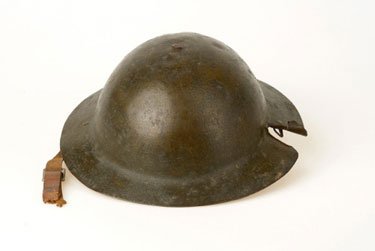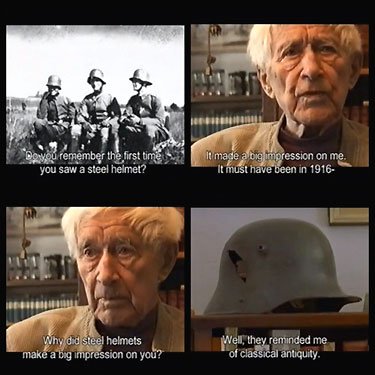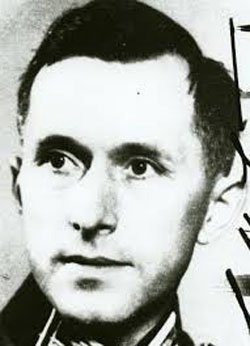Category Archive 'Ernst Jünger'
20 Jan 2019


Alex Colville, in the Spectator, rather ungenerously reviews the new Columbia University Press publication of the wartime diaries of Ernst Jünger.
Ernst Jünger, who died in 1998, aged 102, is now better known for his persona than his work. A deeply confusing and controversial figure who loathed democracy and glorified German militarism, yet despised the Nazis, he not only bore witness to the industrial flesh-mangles of two world wars, but almost the entirety of the 20th century. His writings and insights have long earned him sage
status in Germany. This, the first publication in English of his diaries from 1941–45, heightens his complexity but also makes him a more rounded figure.
This will come as a surprise to those who know him as the ruthless young warrior of the infamous Great War memoir, Storm of Steel, in which Jünger narrates one mass slaughter after another with calm detachment, even coldness — comrades repeatedly blown to bits or shot in the head. The book bristles with militarism, with no room for individual suffering. Men are briefly sketched and swiftly killed, to be replaced by new faces indistinguishable from those before.
Critically wounded 14 times leading raids on British trenches for the Fatherland, Jünger earned the highest military honour in Germany, Pour le Mérite, aged just 23. He becomes a romantic hero, willing to lay down his life for a just cause that bonds men in a firm camaraderie: ‘Battle brings men together, whereas inactivity separates them.’ A bestseller in 1920, it was said to be one of Hitler’s favourite books.
But by 1941 times had changed. Jünger abandoned German nationalism after 1933, forbidding Goebbels to use his work for propaganda purposes, and the Gestapo raided his Berlin flat. He despised the Nazis’ implementation of violence to eliminate the weak, chivalrously believing in its use to protect them — a constant theme of Storm of Steel. He was convinced that women and children at home would benefit from his sacrifice.
RTWT
24 Jun 2018


German steel helmet Mod. 1916 from the collection of Ernst Jünger. Steel, leather | L 31 cm, W 24 cm, H 17.5 cm, G 1250 g | Wilflingen, Ernst Jünger Foundation.
“The steel helmet gives the soldier a desolate look,” noted front-line officer Ernst Jünger (1895-1998) in August 1916 as his unit, the 73rd Infantry Regiment became equipped with the new head protection of the Prussian troops. The engineer Friedrich Schwerd (1872-1953) had designed the helmet with an extended eyeshield and a deep neck guard in 1915 according to military medical specifications, after it had been shown that the spiked leather cap could not provide the soldiers in the trench fighting of the Western Front with sufficient protection. The new helmet was delivered to the troops beginning in the spring of 1916. In the course of the war, 7.5 million of them were produced.
In an infantry assault during the offensive in Flanders, December 1, 1917, Jünger was struck by shrapnel on the head. Although the projectile broke through the helmet, Jünger suffered only minor injuries. The helmet thus became the writer’s most important war trophy and was always kept within reach for life, along with a second steel helmet that Jünger had taken from a fallen English officer in the summer of 1917.
His detailed war diaries served Jünger as the basis for his war memoirs published as Storm of Steel, 1920, which made the writer famous and notorious. Jünger’s description of the murderous battles of the First World War is one of the most important literary sources for what George F. Kennan called “the catastrophe of the 20th century.”

Bavarian Army Museum, Ingoldstadt.
07 Oct 2016

rangordnung:
Marx had asked “Is Achilles possible with gunpowder and lead?†Jünger has answered, “That was my problem.â€
02 Jun 2016


Ernst Jünger (1895-1998)
Karl Marlantes (Y ’67), who served as an officer in the Marine Corps, received the Navy Cross, and wrote perhaps the best Vietnam War novel, is pretty much the ideal choice to write the introduction for the new Penguin Classics edition of Ernst Jünger’s WWI memoir Storm of Steel.
[L]ike Jünger, who observed the stream of colored flares, I can appreciate that, borrowing a phrase from Yeats, there is a terrible beauty about war, even though I’m not a born warrior. I remember watching enemy tracers seeming to float into the night sky over Laos, seeking to down one of our airplanes, in much the same way I’d watch fireworks. I remember even being enthralled, late in my tour when I’d been transferred to an air obÂserver squadron, by green tracers flying by both windows of our OV-10 as we dived firing, head to head with an NVA antiaircraft gun. Jünger sees the beauty—it’s everywhere in his memoir—and perhaps you will see it too. This doesn’t need to change how you judge war; coral snakes and tsunamis are beautiful too.
Jünger writes about many things other than combat, but all take us into the trenches as he saw them. He writes about fear and panic. He writes about nature—about having to live outside, just like a wild animal, in all of nature’s cruelty and beauty. He writes about the code of honor and manliness that engenders mutual respect beÂtween soldiers on opposite sides of the battle, as when he encounÂtered a young British officer just before Christmas during a poignant temporary truce that unfortunately went bad:
We did, though, say much to one another that betokened an almost sportsmanlike admiration for the other, and I’m sure we should have liked to exchange mementoes.
At another point he writes:
Throughout the war, it was always my endeavour to view my opponent without animus, and to form an opinion of him as a man on the basis of the courage he showed.
And he writes about the understated and often gallows humor that goes hand in hand with the code of honor and manliness. I remember in Vietnam a kid waiting to be medevaced, gasping for air because he’d taken a bullet through one lung, saying, “You know, sir, it ruined my whole day.†Jünger often uses such humor:
We suffered many casualties from the over-familiarity engendered by daily encounters with gunpowder. My dugout was somewhat changed as well . . . the British had fumigated it with a few hand-grenades. We were so abundantly graced with trench mortars . . .
In another scene, Jünger describes a fierce skirmish with IndiÂan soldiers from the First Hariana Lancers:
With only twenty men we had seen off a detachment several times larger, and attacking us from more than one side, and in spite of the fact that we had orders to withdraw if we were outnumbered. It was precisely an engagement like this that I’d been dreaming of during the longueurs of positional warfare.
I’d have been dreaming of my high school girlfriends.
“These short expeditions,†Jünger writes, “where a man takes his life in his hands, were a good means of testing our mettle and interrupting the monotony of trench life. There’s nothing worse for a soldier than boredom.†I would say homesickness, hunger, hypothermia, getting gassed, gangrene, and trench foot, not to mention getting killed or maimed, would all be worse than boredom. But Jünger was different.
Read the whole thing.
Your are browsing
the Archives of Never Yet Melted in the 'Ernst Jünger' Category.
/div>

Feeds
|








